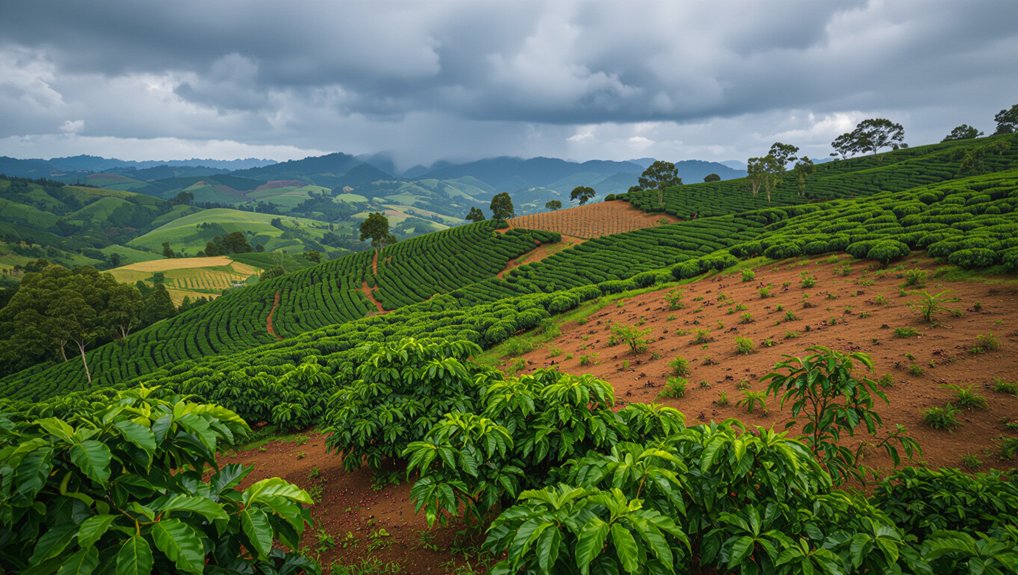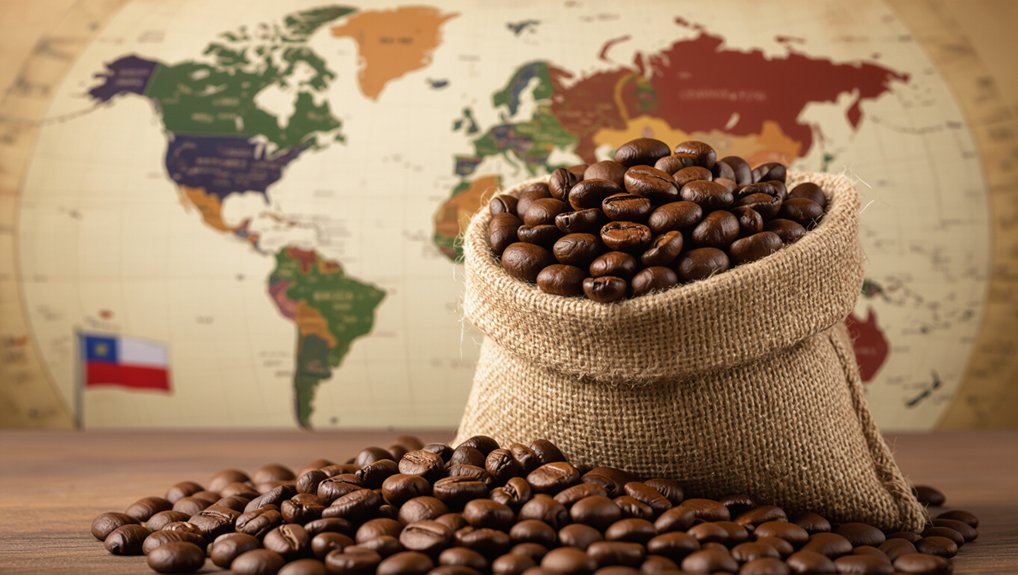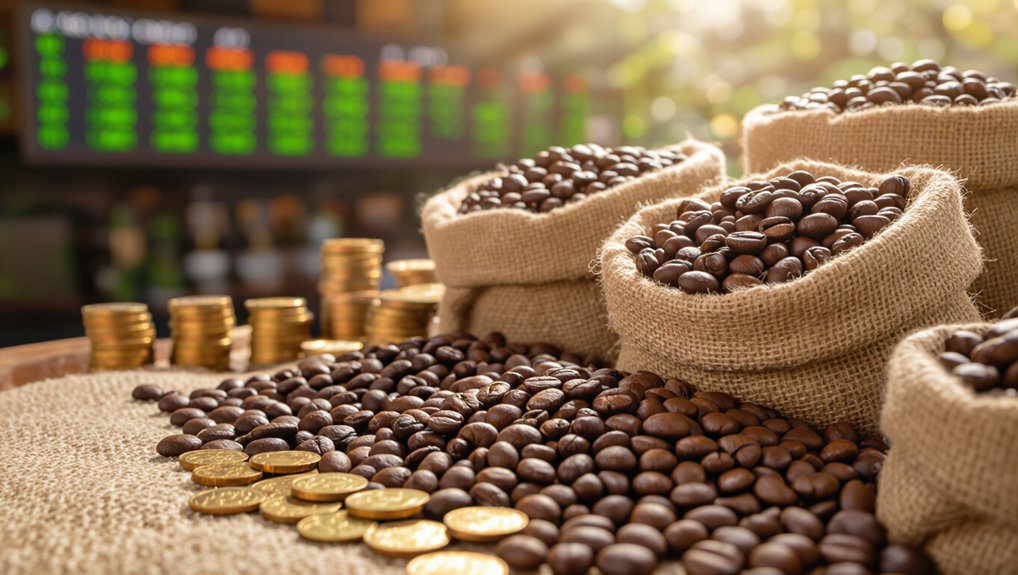Ever wondered why your morning brew costs what it does? Coffee prices fluctuate dramatically across different countries and regions, leaving many consumers puzzled about what drives these variations. From a $1 cup in one city to a $5 specialty drink in another, the cost differences can be striking.
Coffee pricing is a global puzzle that goes way beyond simple bean-to-cup economics. Climate shifts, international trade tensions, and farmer challenges create a complex landscape where every sip tells a story of economic forces at work.
From Brazilian drought impacts to Vietnamese supply chain disruptions, the journey of your coffee is filled with unexpected factors that directly impact what you pay. Keep reading to discover the fascinating economic forces behind your daily caffeine ritual and understand why coffee prices vary so dramatically around the world.
Table of Contents
The Global Coffee Market Landscape

As the global coffee market continues to evolve, coffee lovers and industry professionals are witnessing unprecedented shifts in pricing and production dynamics.
Coffee prices have skyrocketed, driven by climate disruptions in key producing regions like Brazil and Vietnam. These challenges are causing significant strain on the supply chain, with coffee production facing critical obstacles.
Smallholder coffee producers are particularly vulnerable, experiencing minimal financial benefits despite record-breaking market prices.
Transportation costs, weather extremes, and geopolitical tensions compound the complexity, creating a volatile landscape that impacts every cup from farm to café.
Climate Change and Agricultural Challenges

While coffee has long been a global commodity, climate change now threatens its very existence, transforming agricultural landscapes and challenging traditional production methods.
You’ll notice dramatic shifts in coffee supply, with major producers like Brazil and Vietnam experiencing severe drought and rising temperatures that decimate crop yields.
These climate challenges directly impact production costs, pushing coffee prices skyward.
Estimates suggest a potential 50% reduction in suitable cultivation areas by 2050, meaning higher coffee prices are inevitable.
For coffee lovers, this isn’t just an economic issue-it’s a potential crisis that could fundamentally reshape how we experience our beloved brew.
Supply Chain Complexity and Cost Factors

Because coffee travels a complex global journey from farm to cup, comprehension of its supply chain reveals why your morning brew costs what it does.
Transportation costs and production expenses significantly impact coffee prices, with multiple intermediaries adding layers of expense. You’ll encounter exporters, importers, and logistics providers who each contribute to the final price tag.
The C market rate sets a baseline, but warehousing, export fees, and quality maintenance during transit create substantial markups. Geographic considerations and country-specific differentials further complicate pricing, meaning your seemingly simple cup of coffee represents an intricate global economic dance.
Economic Influences on Coffee Pricing

When navigating the intricate world of coffee pricing, you’ll quickly discover that economic forces play a pivotal role in determining what you’ll pay for your daily brew.
The complex dance of global economics impacts coffee prices through multiple channels:
- Production costs rising dramatically due to increased fertilizer and packaging expenses
- Supply shortages triggered by currency fluctuations and geopolitical tensions
- Global demand outpacing available coffee inventory
These interconnected factors create a volatile pricing landscape where even minor economic shifts can significantly impact your morning cup’s cost.
Comprehending these nuanced economic influences helps coffee lovers appreciate the journey from bean to brew.
Geopolitical Dynamics Impacting Coffee Costs

The economic forces driving coffee prices aren’t just about supply and demand-they’re deeply intertwined with global political landscapes.
Geopolitical tensions have become a major catalyst for coffee price volatility, creating significant supply constraints that impact your morning brew. Coffee futures markets react quickly to international conflicts, causing dramatic price shifts.
When trade routes are disrupted or key producing regions face political instability, you’ll see immediate ripple effects in coffee prices worldwide.
These complex dynamics mean coffee lovers must stay informed about global events that could impact their favorite beverage’s availability and cost.
Technology and Production Efficiency

As coffee lovers increasingly seek exceptional brews, technological innovations are revolutionizing how we grow, harvest, and process our favorite beans.
Technology’s impact on coffee production directly influences pricing and efficiency:
- Precision farming techniques maximize crop yields
- Advanced processing methods reduce maintenance costs
- Sustainable technologies create long-term price stability
I’ve seen how these innovations transform coffee production.
Modern technology allows farmers to optimize growing conditions, dramatically improving bean quality while keeping production costs manageable.
By investing in cutting-edge equipment and techniques, producers can deliver premium coffee at more competitive prices.
The result? Better beans, more consistent quality, and potential savings that benefit both producers and consumers.
Market Speculation and Trading Mechanisms

Leveraging technological advancements in coffee production opens the door to comprehension another critical factor shaping global coffee prices: market speculation.
Futures contracts on the ICE Coffee C market play a pivotal role in determining coffee prices worldwide. Traders bet on supply and demand fluctuations, driving prices up or down based on anticipated market conditions.
When geopolitical tensions or logistical challenges emerge, speculation intensifies, causing dramatic price swings. Unfortunately, these price movements often benefit intermediaries more than coffee producers, creating a complex economic landscape that impacts every cup you brew.
Consumer Behavior and Demand Trends

How do coffee lovers navigate the ever-changing landscape of pricing and quality? Consumer behavior in the specialty coffee market reveals fascinating trends:
- Some enthusiasts willingly pay premium prices for high-quality, locally sourced brews.
- Others strategically reduce consumption or seek more affordable options.
- Ethical sourcing and sustainability increasingly influence purchasing decisions.
Despite rising coffee prices, dedicated consumers demonstrate remarkable loyalty.
They’re balancing budget constraints with a commitment to quality, often prioritizing local cafes and artisanal roasters.
This nuanced approach reflects a deeper comprehension of coffee’s value beyond mere cost, showcasing how passionate coffee drinkers adapt to market fluctuations while maintaining their appreciation for exceptional beans.
Sustainable Practices and Fair Trade Initiatives

When we dive into the world of sustainable coffee practices, you’ll quickly discover it’s more than just a buzzword-it’s a critical lifeline for farmers and our planet.
Fair trade initiatives ensure coffee producers receive fair compensation, while sustainable methods help combat climate change’s impact on crops. By investing in environmentally friendly farming techniques, we’re not just improving coffee quality-we’re supporting entire communities.
Certifications from fair trade organizations mandate standards that protect workers and promote ecological balance. This means every cup you drink can contribute to meaningful change, connecting conscious consumers with hardworking farmers who are adapting to increasingly challenging agricultural landscapes.
Frequently Asked Questions
What Factors Affect Coffee Prices?
I see coffee prices soaring due to climate disruptions, geopolitical tensions, shipping challenges, currency fluctuations, and speculative trading. These complex factors drive up costs, making your morning brew increasingly expensive.
What Economic Factors Affect the Coffee Market?
I’ll explain the key economic factors affecting the coffee market: currency fluctuations, global trade dynamics, production costs, supply chain disruptions, and speculative trading all significantly impact coffee prices worldwide, creating complex market volatility.
What Is Causing the Price of Coffee to Go Up?
I’ll tell you straight: climate disruptions, droughts in Brazil and Vietnam, shipping challenges, labor shortages, and a weak U.S. dollar are driving coffee prices skyward, creating unprecedented market volatility and pushing costs to historic highs.
What Factors Can Lead to an Increase in the Price of Coffee in Economics?
I’ll explain the key economic factors driving coffee prices up: supply chain disruptions, climate change impacts, production costs, geopolitical tensions, and speculative market trading all contribute to making your morning brew more expensive.
In Conclusion
As a coffee lover, I’ve learned that comprehension of coffee prices isn’t just about numbers-it’s about global connections. Climate change, economic shifts, and consumer choices are constantly reshaping our coffee experience. You’ll find that sustainability, technology, and market dynamics are more interconnected than you might think. Whether you’re a casual sipper or a brewing enthusiast, these complex factors directly impact the delicious cup you enjoy every morning.







